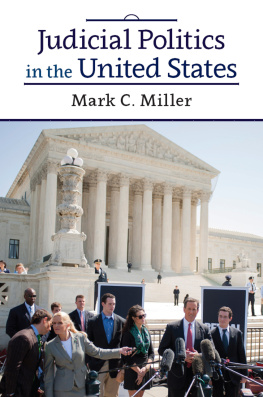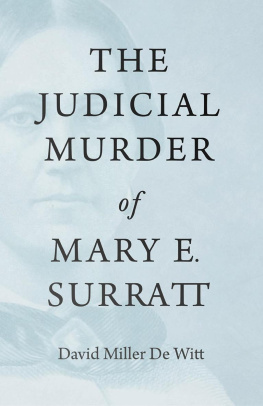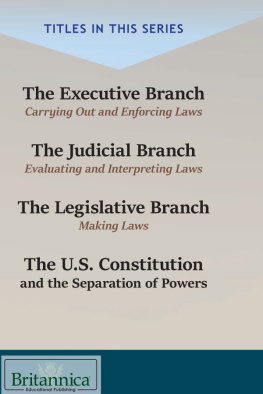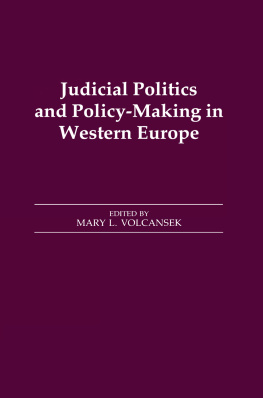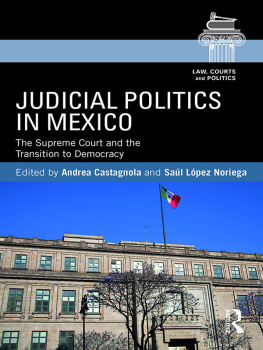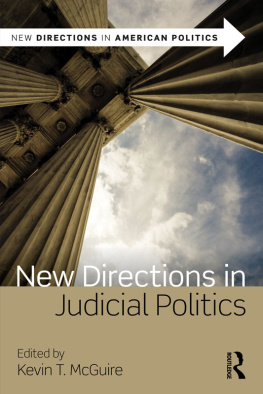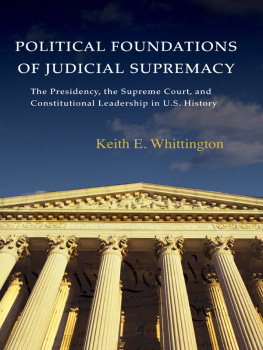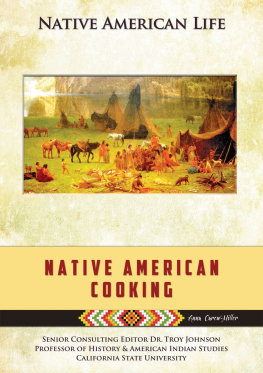Judicial Politics in the United States
Judicial Politics in the United States
Mark C. Miller
CLARK UNIVERSITY
First published 2015 by Westview Press
Published 2018 by Routledge
711 Third Avenue, New York, NY 10017, USA
2 Park Square, Milton Park, Abingdon, Oxon OX14 4RN
Routledge is an imprint of the Taylor & Francis Group, an informa business
Copyright 2015 Taylor & Francis
All rights reserved. No part of this book may be reprinted or reproduced or utilised in any form or by any electronic, mechanical, or other means, now known or hereafter invented, including photocopying and recording, or in any information storage or retrieval system, without permission in writing from the publishers.
Notice:
Product or corporate names may be trademarks or registered trademarks, and are used only for identification and explanation without intent to infringe.
Every effort has been made to secure required permissions for all text, images, maps, and other art reprinted in this volume.
Set in 10 point Minion Pro by the Perseus Books Group
Library of Congress Cataloging-in-Publication Data
Miller, Mark C. (Mark Carlton), 1958
Judicial politics in the United States / Mark C. Miller.
pages cm
Includes bibliographical references and index.
ISBN 978-0-8133-4679-3 (paperback) ISBN 978-0-8133-4680-9 (e-book)
1. Political questions and judicial powerUnited States. 2. CourtsUnited States. 3. Judicial processUnited States. 4. United StatesPolitics and government.
I. Title.
KF5130.M53 2014
347.73dc23
2014011388
ISBN 13: 978-0-8133-4679-3 (pbk)
CONTENTS
Like most projects of this type, this book has been a long time in the making. I first developed my interest in judicial politics when I worked as a legislative assistant/ staff attorney in the office of the late U.S. Representative John F. Seiberling (D-Ohio). Congressman Seiberling was a lawyers lawyer, who could easily find drafting errors in a two-hundred-page piece of legislation. He taught me to love the courts and the law, all from a political perspective.
After the congressman announced his retirement from Congress, I went to graduate school in political science at The Ohio State University. At Ohio State, I was able to teach an undergraduate course on U.S. judicial politics as a graduate student. I also learned a great deal about the study of judicial politics from Professors Larry Baum, Elliot Slotnick, and Greg Caldeira. I owe them all a great deal of gratitude for all their help over the years. Larry Baum has been willing to write many letters of recommendation for me over the years, and I truly appreciate his generosity.
My first full-time teaching job after graduate school was at Clark University in Worcester, Massachusetts, where I remain today. At Clark, I was able to found Clarks Law and Society Program, which is an interdisciplinary minor that helps students study law-related issues from a liberal arts perspective. I have also had the opportunity to teach U.S. judicial politics courses on our Worcester campus and comparative judicial politics in our study-abroad program in Luxembourg. I want to thank all of my students at Clark, who have always asked good questions and made life much more interesting. I also want to thank our excellent staff of reference librarians at the Goddard Library at Clark. They have always helped me find answers to my most obscure questions, and they have provided outstanding assistance to my undergraduate students during their many research endeavors.
I would also like to thank my political science colleagues at Clark, who have given me enormous personal and institutional support over the years. I would like especially to thank my Law and Society colleagues at Clark, who come from many departments all over campus, with special thanks to Professors Patty Ewick in sociology and Judi DeCew in philosophy. I have greatly enjoyed our legally based and pedagogical conversations. I also want to thank Professor Kent Rissmiller at Worcester Polytechnic Institute, who has occasionally allowed me to teach judicial politics courses at WPI to their much more natural-sciencefocused students. The Clark and WPI students are very different in many ways, but I have learned a great deal from both groups.
Clark University has also allowed me to have a variety of stimulating sabbatical and other experiences. For example, I was able to teach law-related courses in the American Studies Program at Leiden University in the Netherlands through the Fulbright program. My friends and colleagues at Leiden deserve a great deal of thanks for all of their help and assistance. I especially want to thank my colleagues in the U.S. Supreme Court Judicial Fellows Alumni Association. Serving as a Judicial Fellow at the Supreme Court of the United States has certainly enhanced my understanding of judicial politics. I also want to thank all the high school students whom I have taught over the years through the Junior Statesmen of America program. These talented high school students have taken a collegelevel law-related course from me during the JSA summer school programs held at Northwestern, Yale, Georgetown, and Stanford Universities.
I would like to thank Ada Fung at Westview Press for all her help in guiding this undertaking to its successful completion. Thanks to my project editor, Cisca L. Schreefel, and copyeditor, Sue Warga, for their work on this book. I would also like to thank the peer reviewers for their thoughtful and detailed comments on the manuscript, including: Sara Benesh (University of Wisconsin, Milwaukee), Paul Chen (Western Washington University), John Hermann (Trinity University), Karen Hult (Virginia Polytechnic Institute and State University), Paul Lermack (Bradley University), Lydia Tiede (University of Houston), Tammy Sarrer (Benedictine University), Eric Waltenburg (Purdue University), and the others who wished to remain anonymous.
Finally, I must thank my parents for all their love and support over the years. While they may not read all the books I have written, they certainly display them proudly on the bookshelves that my father has lovingly made by hand. My mother makes sure that my books are arranged in just the right order. They were both educators before they retired, and they tolerate my grading of papers and exams while watching sporting events with them during my end-ofsemester visits.
The study of American judicial politics involves examining how courts, judges, and other judicial actors function and interact in the U.S. political system. For a long time, scholars studying the courts tended to treat them as a unique branch of the government, and judicial scholars tended to focus solely on the judiciary. Today, however, more and more scholars are studying the courts not as isolated institutions but instead as vital parts of the larger integrated political system. Scholars are now looking at how judges and courts interact with the other branches of government and with the general public. They are also studying how American judges interact with their colleagues abroad. Thus, courts are now seen as a part of the broader system of government in a world transformed by globalization.
Courts are generally becoming more important and increasing their power around the globe. Therefore, it seems natural that the study of judicial politics started with the political study of courts and law in the United States before spreading into the study of judicial systems around the world. This book will focus on judicial politics in the United States, although it will make comparisons to other countries when appropriate.



